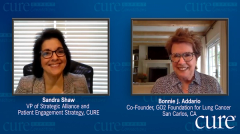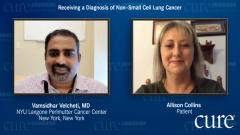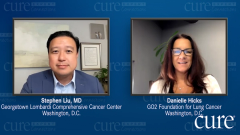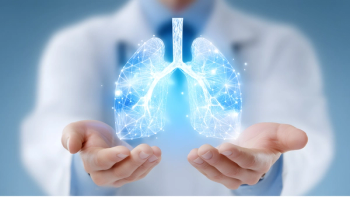
Importance of Biomarker Testing in Non-Small Cell Lung Cancer
Bonnie Addario, a lung cancer survivor, explains the importance of comprehensive biomarker testing in patients with lung cancer to treat to target and coverage from insurance companies.
Episodes in this series

Sandra Shaw: Hello, and welcome to CURE® Expert Connections® on biomarker testing in lung cancer. I’m Sandra Shaw, head of CURE®’s strategic alliance partnerships and patient engagement strategy. I’d like to welcome Bonnie Addario, a 17-year lung cancer survivor and a co-founder and the chair of the board of the GO2 Foundation for lung cancer, to our program on biomarker testing in lung cancer. Welcome, Bonnie.
Bonnie Addario: Thank you, Sandra. Happy to be here.
Sandra Shaw: Thanks for joining us. I’d like to start with the basics on biomarkers in cancer in general. What are biomarkers?
Bonnie Addario: That’s a great question. When you’re first diagnosed with cancer, the pathologist lets you know what kind of lung cancer you have: small cell, non-small cell, or something else. But there’s something else you need to be tested for and that’s called a comprehensive biomarker. That tells you what’s actually driving your lung cancer. Whether you have an EGFR mutation, whether you have an ALK mutation, NTRK—I could go on. We actually have 10 biomarkers now that let us know how to treat patients with a very specific drug, a targeted drug made for their biomarker.
Sandra Shaw: When do doctors test for these biomarkers?
Bonnie Addario: Ideally, right after the pathologist sends in your report on your test. It should be right away. It should be one of the first things that happens, because if patient is put on a therapy before getting this test, it could eliminate them from a clinical trial or for several other kinds of therapies down the road. It should be immediately upon receiving the pathologist’s report.
Sandra Shaw: Do all doctors test all patients with cancer for these biomarkers?
Bonnie Addario: No. That’s why I said the word “comprehensive.” We should all be using the word “comprehensive biomarker” because that means you’re getting the complete test for every marker known to us at this point in time. I never want to make it sound like I’m being negative about community doctors—bless them because for the most part they have so much to do. They’re trying to manage multiple cancers on a daily basis, and it’s almost impossible to keep up with what’s happening in every cancer. But in lung cancer, it’s probably more difficult to keep up with because it’s on the move. Lung cancer therapies are on the move, targeted markers, targeted drugs. This is the best news: If you have lung cancer, now is the time to have it.
Sandra Shaw: Do patients have to request biomarker testing?
Bonnie Addario: Yes, they do, because some physicians will test for just one or two markers—the biggest ones—and not test for all. That’s not OK. But upon diagnosis, unless patients have a family member or somebody close to them who has had lung cancer, they don’t know anything about it. More often, they’re not going to ask the doctor for that test. We need it to come from the physician themselves, and we need it through education and information.
Sandra Shaw: You can’t get enough education and information. When you think about biomarkers, can you help patients understand if having a biomarker a good thing or a bad thing?
Bonnie Addario: Having a biomarker is like winning the lotto. Every patient with lung cancer is unique. One size does not fit all. That’s why you have to have this testing. If you have an EGFR marker, or an ALK or NTRK or METor RET or any of those things, the physician is going to put you on a drug that was made for you personally, for that driver of your lung cancer. That’s how you’re going to be tested throughout your cancer. However, we have seen mutations mutate. We have seen patients diagnosed with an EGFR marker that upon progression is an ALK marker. You need the test early on when you’re diagnosed, but you also need it upon progression.
Sandra Shaw: Biomarkers can change over time?
Bonnie Addario: They can. We don’t see it on a regular basis, but that’s why we need the testing. You can’t just assume that if the patient is progressing, then they go on another EGFR drug. They might need to be on a much different drug or maybe a clinical trial. That is the best thing for what their progression looks like.
Sandra Shaw: I wish finance wasn’t part of this, but will insurance pay for biomarker testing?
Bonnie Addario: Not always. It depends on what kind of insurance you have. The good news is that the cost of biomarker testing is starting to go down. In my career a long time ago, we corrected our costs based on volume. I’m very positive that the companies that are doing the genomic testing would be very open to dropping the cost if they had more testing done. Right now, we’re lucky if a third of patients with lung cancer are getting the full biomarker test.
Sandra Shaw: Wow. We have a long way to go. You mentioned that in lung cancer, we’ve got 10 biomarkers that have been identified. What does it mean for a biomarker to be actionable vs one that’s not?
Bonnie Addario: We’re moving at such a fast pace. A few years ago, no one even knew what immunotherapy was. That’s when your immune system, with the right drug for immunotherapy, activates and starts to do what it’s supposed to be doing: finding these things in your body and going after them and destroying them. Unfortunately, not everybody has as a biomarker for immunotherapy, but they could down the road. We’re starting to put various drugs together. What we have discovered is that chemotherapy can be a great booster to get immunotherapy on the job and doing what it’s meant to do. But there’s still so much to do, in terms of clinical trials and finding out what all these combinations can be. It’s not just one biomarker and one drug. It starts out as one biomarker, but along the way, it can become multiple biomarkers. Some are in clinical trials and will be approved hopefully by the FDA very shortly thereafter. The FDA has been an amazing partner moving things along much quicker than they were ever doing before. We don’t have to wait for a four-year clinical trial to prove that this biomarker matches with this particular drug or this patient. But there’s still so much to do, so much we don’t know.
Transcript edited for clarity.







